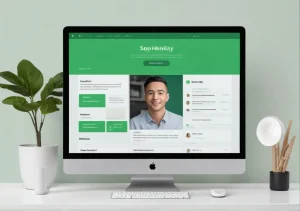Picture this: You’re at the final interview stage with Microsoft, and the topic of salary comes up. Your palms start sweating, but it’s not just the clammy hands; it’s the weight of a question you know can shape your future.
This blog post is your trusty map to the treasure trove of salary negotiation with one of the tech giants – no X marks the spot, but a clear path to getting the compensation you deserve.
Quick Takeaways:
- Research salaries for your role and experience on platforms like Glassdoor and LinkedIn to establish a grounded compensation range.
- Approach salary discussions with confidence after Microsoft makes an initial offer, indicating your values and achievements with concrete examples.
- Have a BATNA in place and consider the whole package, including benefits and growth opportunities, not just the base salary.
What Should You Know About Microsoft’s Compensation Philosophy?
When you’re stepping into the negotiation ring with a heavyweight like Microsoft, it’s crucial to understand their compensation playbook. Microsoft prides itself on offering a total rewards package that goes beyond just the base salary. Think of it as a cocktail of salary, bonuses, and stock options, shaken up with a range of benefits and perks.
The tech giant is known for rewarding performance and ensuring its compensation packages are competitive within the market. Why does this matter to you? Well, if you’ve got a track record of bringing your A-game, you’re in a stronger position to negotiate.
Being aware of Microsoft’s commitment to market competitiveness is like having an ace up your sleeve. It means they aim to offer salaries aligning with the best in the industry. Knowing this, you can bet on the fact that they’ve done their homework on what the market’s paying – and so should you.
How Can You Effectively Research Your Worth?
Before you put your cards on the table, you’ve got to know the stakes. Here’s where websites like Glassdoor, LinkedIn Salary, and PayScale are invaluable. These platforms can help you suss out what others in similar roles, with comparable experience and in the same locale, are making.
Here’s how to shuffle through this info:
- Find Your Role: Look at job postings similar to the one you’ve snagged an interview for at Microsoft. Take note of the salary ranges that pop up.
- Experience Level Matters: Match your years of experience and skill set with those listed in the salary reports.
- Location, Location, Location: Salaries can wildly differ based on where you’re at. Make sure you’re looking at data that’s relevant to Microsoft’s area or where you’ll be working.
- Compare and Contrast: Use this researched data to get a ballpark figure of your worth in the current market.
With this treasure trove of information, you’ll sharpen your edge – you’ll not only know what to ask for, but you’ll also have the evidence to back it up.
When Is the Right Time to Discuss Salary?
Talking turkey about salary can be a delicate dance. Do it too soon, and you might come off as only caring about the cash. Wait too long, and you could end up sweating bullets in uncertainty. So, when’s the perfect time to swing into the salary soiree?
It’s practical (and polite!) to let Microsoft take the lead. Ideally, salary discussions should unfold after they’ve extended an initial offer. That’s your green light to start talking numbers. By waiting, not only do you show that you’re seriously intrigued by the role and the company, but you’re also in a better position to negotiate, having already won them over with your skills and potential fit within their team.
Now, if they lob the “What are your salary expectations?” question over to your side of the net early on, it’s okay to serve back a range. Be sure to base this on the diligent research you’ve done and keep it somewhat broad – it’ll give you the room to volley back and forth later.
Remember, negotiating your salary at Microsoft isn’t the end of a conversation – it’s a vital part of starting a new chapter with confidence and clarity. So take a deep breath, step up to the plate with all the prep work you’ve done, and swing for a salary that reflects your value. And who knows? With the right strategy, you might just knock it out of the park.
What Are Some Winning Negotiation Tactics?
When you’re sitting at the negotiation table with a giant like Microsoft, it’s crucial to come armed with more than just your resume. Let’s get right into the tactics that can turn the tides in your favor.
To start, show uncompromised enthusiasm for the role. Your excitement signals your commitment and can be just as compelling as your skill set. This isn’t just about singing praises; it’s about conveying genuine interest in the company’s mission and the specific position.
Expressing your value is non-negotiable . Highlight your past achievements with concrete numbers and scenarios. Did you increase revenue by a certain percentage? Save your previous company money through innovative solutions? These are your golden tickets. Remember, your accomplishments should be the star of the show, not just a supporting act.
As you approach the actual conversation, remember to keep a balance between confidence and humility. Confidence showcases your belief in your worth, while humility ensures you don’t come off as arrogant. It’s a dance, so let’s tango with tact.
Here’s a pro tip: Use the “FBI negotiation method”. Start with a fair offer that’s in line with your market value, then respect the conversation as a “give-and-take.” By showing you’re open to dialog while remaining firm, you’ll open up the potential for a productive negotiation.
And don’t forget to have a BATNA – Best Alternative To a Negotiated Agreement. Knowing your fallback position, such as another job offer, gives you an edge and allows you to negotiate from a position of strength.
How Do You Handle Counteroffers and Rejections?
Nobody said this would be a walk in the park. When Microsoft counters, they’re showing their hand, and it’s time to play yours smartly.
First, take a step back and analyze the counteroffer. Is it close to what you were hoping for? Does it meet your minimum acceptable salary? Remember, it’s not just about the base salary; consider the complete package including benefits, bonuses, and growth opportunities.
Should you decide the counter offer is reasonable but not ideal, consider negotiating for perks such as additional vacation days, a signing bonus, or educational allowances. Sometimes these benefits can bridge the gap to your targeted compensation.
If you find yourself staring down the barrel of a rejection, keep your cool. Politely ask for the rationale behind their decision. This will provide you with insights that could be useful for future negotiations or may even provide an opening for you to address any concerns.
Here’s an exclusive nugget: pivot to professional development opportunities. If a higher salary is off the table, perhaps they might be willing to invest in your skills and career growth through courses or certifications, which can be a lucrative long-term investment.
At some point, you might need to recognize when to fold ’em. If the offer doesn’t meet your needs and no middle ground can be found, it may be time to walk away. This is where your BATNA comes into play again. If you have a strong alternative, it can ease the decision to decline.
In conclusion, negotiating with Microsoft – or any company for that matter – isn’t just a cut-and-dry process. It’s an art form that requires preparation, strategy, and a dash of psychology. Stand your ground, be flexible where it counts, and always, always communicate your value. Winning the salary you deserve is about demonstrating how much more value you’ll bring to the team. It’s not just a battle of numbers, but one of perception and persuasion.
By heading into negotiations with these pointers in your arsenal, you’ll be well-equipped to make a compelling case for yourself. Remember, negotiation is a two-way street, and it’s all about crafting a deal where both you and Microsoft come out winners.


